Key takeaways:
- Understanding baking science, such as the impact of ingredient measurements and mixing techniques, is essential for overcoming failures.
- Embracing mistakes and reflecting on them can lead to improved baking skills and appreciation for the art.
- Implementing precise measurements and monitoring oven temperatures significantly enhances baking outcomes.
- Adapting recipes through ingredient substitutions and understanding their properties can yield better results and inspire creativity in the kitchen.
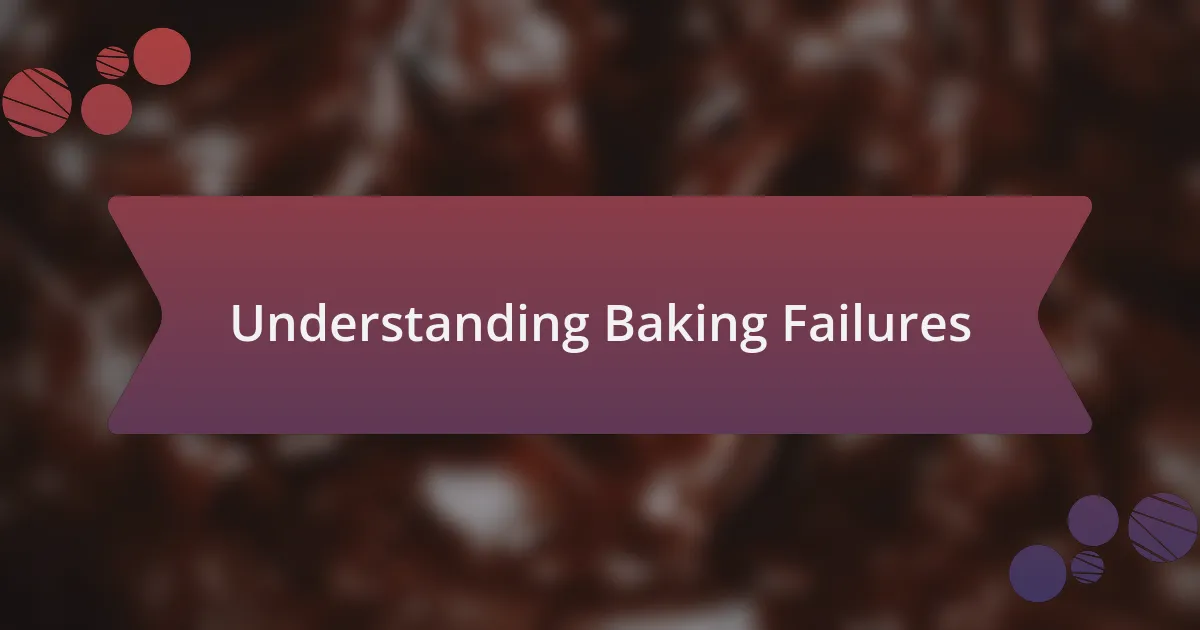
Understanding Baking Failures
Baking failures can be incredibly disheartening, especially after you’ve invested time and hope into a recipe. I remember my first attempt at a soufflé; it collapsed spectacularly, leaving me feeling defeated. Have you ever felt that twinge of despair when your carefully crafted treat doesn’t turn out as expected?
Understanding the science behind baking is key to overcoming these pitfalls. For instance, overmixing batter can lead to dense, gummy textures that are far from the light and airy result we crave. When I realized that my impatience was often my biggest adversary, it was a game-changer in my baking journey.
Each failure carries a lesson waiting to be uncovered. I learned not to shy away from mistakes, but rather to embrace them. Why did that bread rise perfectly once but fall flat the next? Reflecting on my baking missteps has not only honed my skills but has also deepened my appreciation for the art of baking.
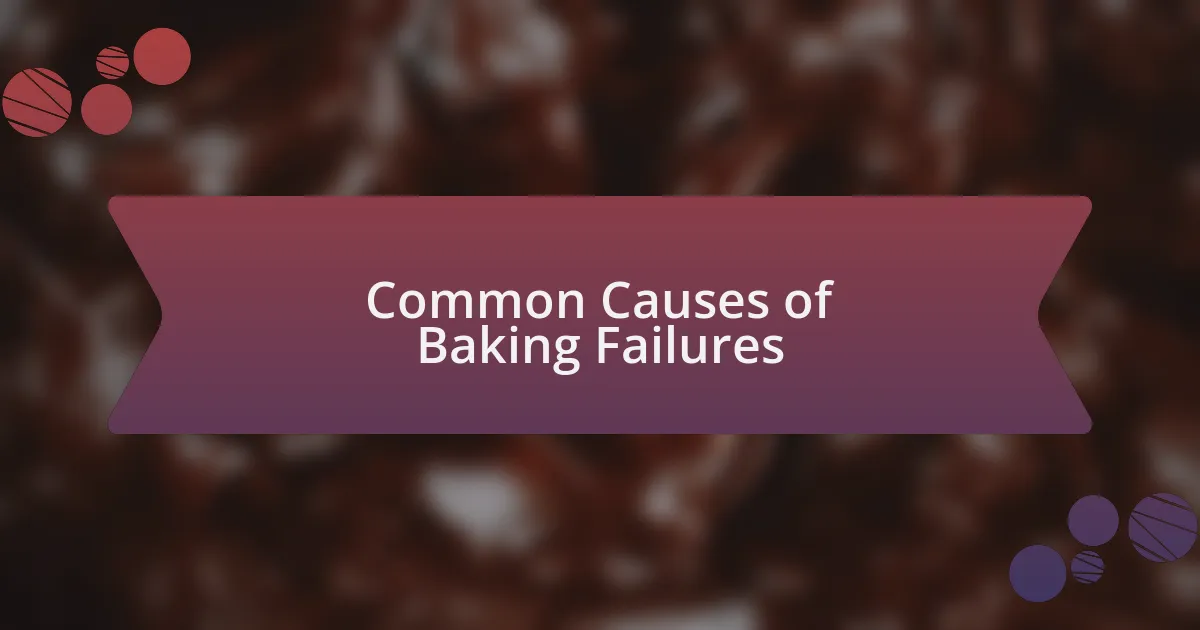
Common Causes of Baking Failures
When I first started experimenting with cake recipes, I quickly realized that ingredient measurements are not to be taken lightly. I remember a time when I mistakenly swapped tablespoons for teaspoons, resulting in a cake that tasted more like a bricks than a treat. Can you imagine the disappointment of cutting into a dessert that was meant to be fluffy and delicious, only to end up with a block of disappointment?
Another common failure I’ve encountered is temperature mismanagement. Baking requires a delicate balance of heat, and I’ve often rushed the preheating process, only to face uneven baking results. Once, I pulled cookies out of the oven thinking they looked perfectly golden, only to discover they were raw in the middle. It makes me wonder how often we overlook these little details until they come back to haunt us in the form of a baking disaster.
Lastly, let’s talk about the importance of using fresh ingredients. I once tried to bake cookies with stale baking powder, thinking they would still turn out alright. Spoiler alert: they didn’t rise at all. This taught me that even the simplest things, like checking your ingredients, can have a huge impact on the final product. Have you ever been in a similar situation where a small oversight led to a major setback? I have, and it drove home the lesson that freshness matters.
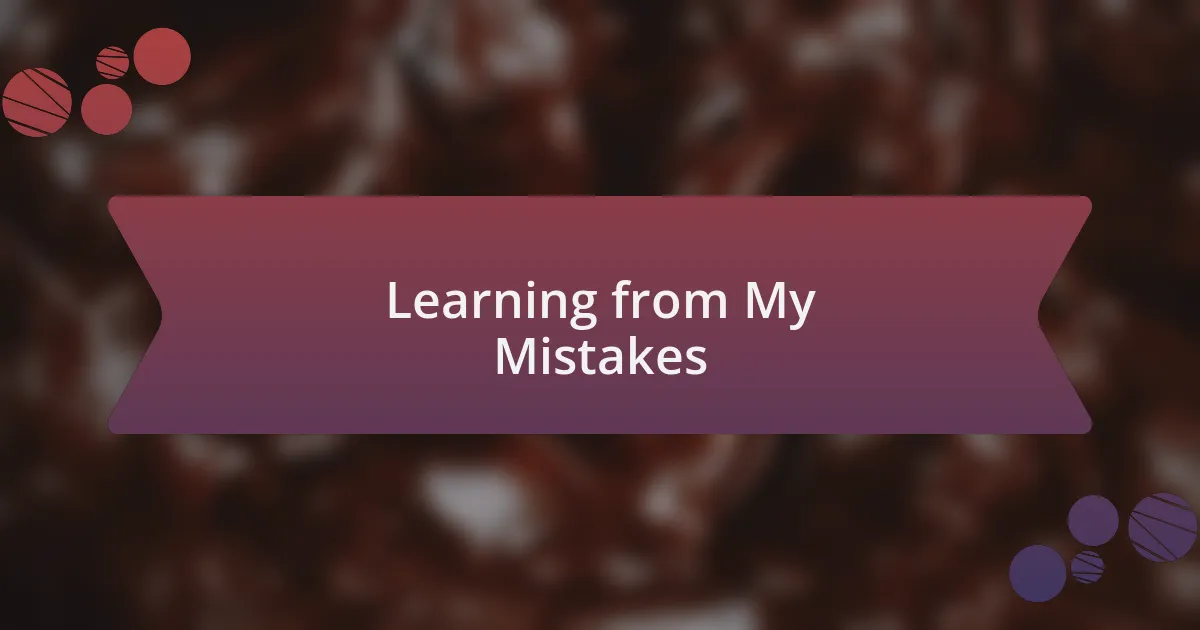
Learning from My Mistakes
Learning from my mistakes has been a crucial part of my baking journey. There was a time I forgot to sift my flour, thinking it was a minor step. When my cake emerged dense and heavy, I realized how small oversights can lead to big problems. Have you ever felt that sting of disappointment when you knew you could have done better?
Another lesson came when I mistakenly combined the wet and dry ingredients too aggressively. I ended up with a batter that was more of a gloppy mess than a smooth blend. That moment taught me the importance of patience. Sometimes, it’s not just about following the recipe; it’s about taking your time to ensure each step is done right. How often do we rush through tasks and miss key components?
I also discovered that tracking my baking success and failures in a journal has been transformative. When I record what went wrong, like forgetting to adjust baking times, I can pinpoint patterns. This reflective practice gives me insights into areas that need improvement. Have you ever taken a moment to analyze your kitchen mishaps? I urge you to do so—it’s not just about baking; it’s about growth.
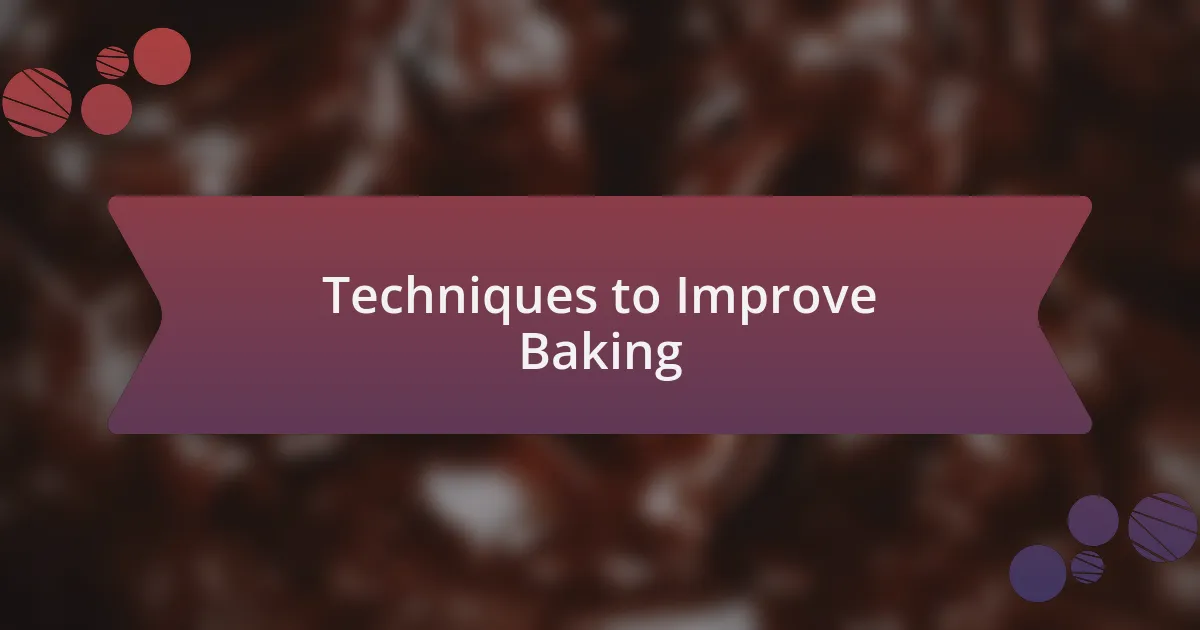
Techniques to Improve Baking
One technique I’ve found incredibly helpful is measuring ingredients with precision. I used to eyeball everything, which led to confusion and inconsistent results. When I finally invested in a kitchen scale, I marveled at how much a few extra grams could affect the texture and taste of my baked goods—have you ever noticed how a simple change can alter the entire outcome?
Another key technique is interpreting your oven. Early on, I’d assume every oven temperature was accurate, but I learned the hard way that they can vary significantly. I started using an oven thermometer to ensure the temperature matched what I set. This simple tool has made a world of difference; my baked goods now rise beautifully and bake evenly. Is it possible that your oven is holding you back too?
Finally, I’ve embraced the power of practice and experimentation. I remember a time I attempted a new recipe on a whim, leaving my comfort zone behind. The first attempt was a flop—but it ignited a passion in me to try again. I now relish the opportunity to tweak recipes based on past fails or even an idea that pops into my mind. Have you ever thought of your kitchen as a creative lab rather than just a place to cook?
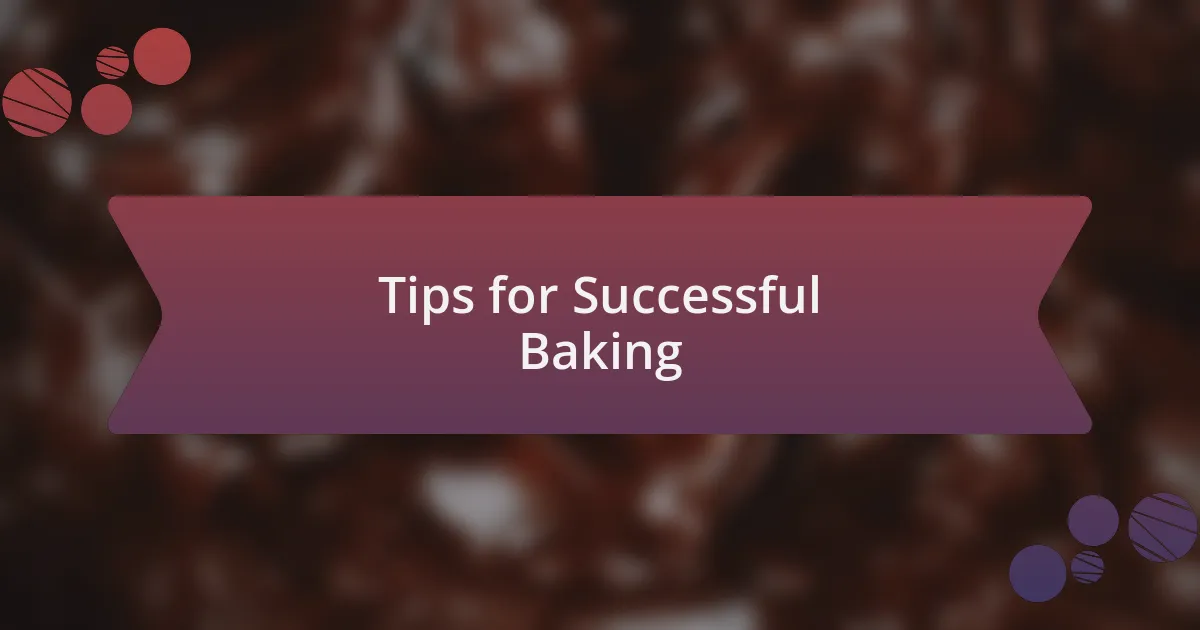
Tips for Successful Baking
It’s fascinating how crucial oven placement can be for successful baking. I remember a batch of cookies I baked squished in the back of the oven, which left them undercooked in the center while the edges were crisp. Once I shifted my baking trays to the center rack, everything changed. Have you ever realized that a simple adjustment could elevate your baking from mediocre to magnificent?
Another tip is to understand the role of room temperature ingredients. I used to rush my baking, pulling eggs straight from the fridge. One day, I made a cake with room-temperature eggs and was amazed at how airy and fluffy the texture was. This taught me that, sometimes, patience truly pays off—what would happen if you allowed your ingredients to warm up as well?
Lastly, always trust your instincts about scent and texture during the baking process. I vividly recall baking a loaf of bread that smelled heavenly but felt off. I hesitated, thinking the recipe was fail-proof. When I finally trusted my gut and checked for doneness early, I saved that loaf just in time. Have you ever experienced that moment where listening to your instincts turned a potential disaster into a delightful surprise?
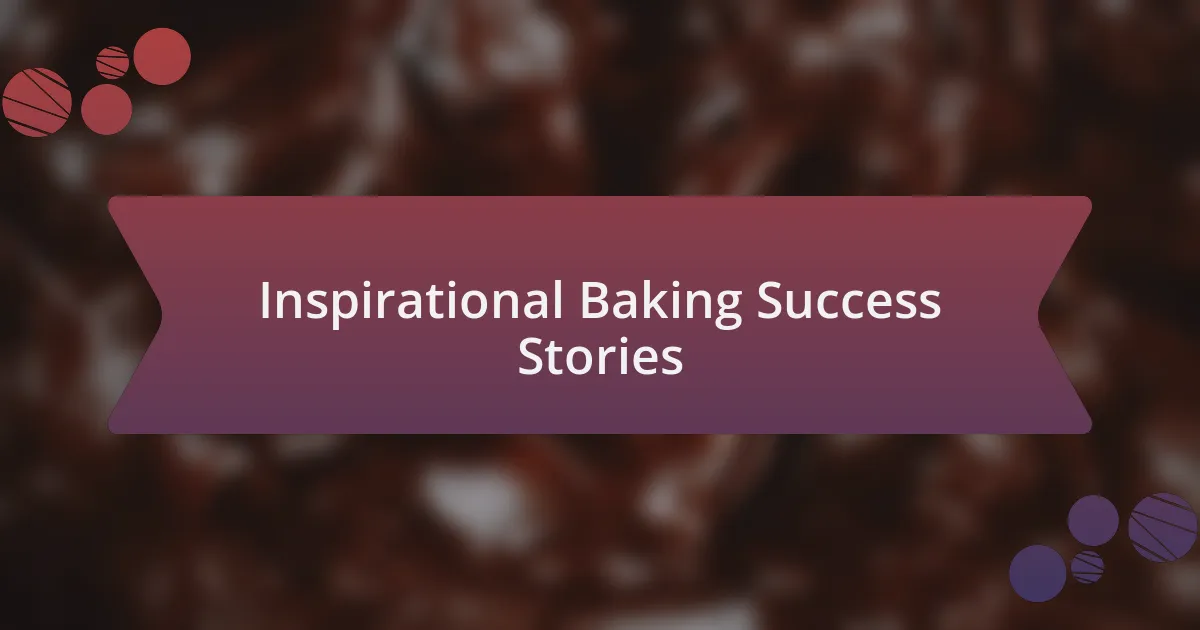
Inspirational Baking Success Stories
I once baked a chocolate soufflé for a dinner party and panicked when it didn’t rise as expected. Instead of tossing it out, I whipped up a passionate raspberry coulis to drench it and served it anyway. To my surprise, guests raved about the flavor combination, teaching me that sometimes it’s not just about perfection, but how you handle the unexpected.
Another memorable baking success happened when I decided to experiment with sourdough. My first few loaves were dense and flat, but I kept trying. After one particularly stubborn batch, I finally discovered the magic of longer fermentation. The thrill of pulling out a beautifully risen loaf, with a crust that crackled as I sliced into it, was indescribable. Have you ever felt that joy of finally mastering a technique after countless trials?
In a different baking adventure, I set out to recreate my grandmother’s famous apple pie. After failing multiple times, I almost gave up until I recalled her secret of letting the apples marinate with sugar before baking. Embracing that tip transformed my pie into a sweet masterpiece, rich with flavor and nostalgia. It’s moments like these that make baking not just a task, but a deep, emotional journey. What lessons have you learned in the kitchen that turned your failures into triumphs?
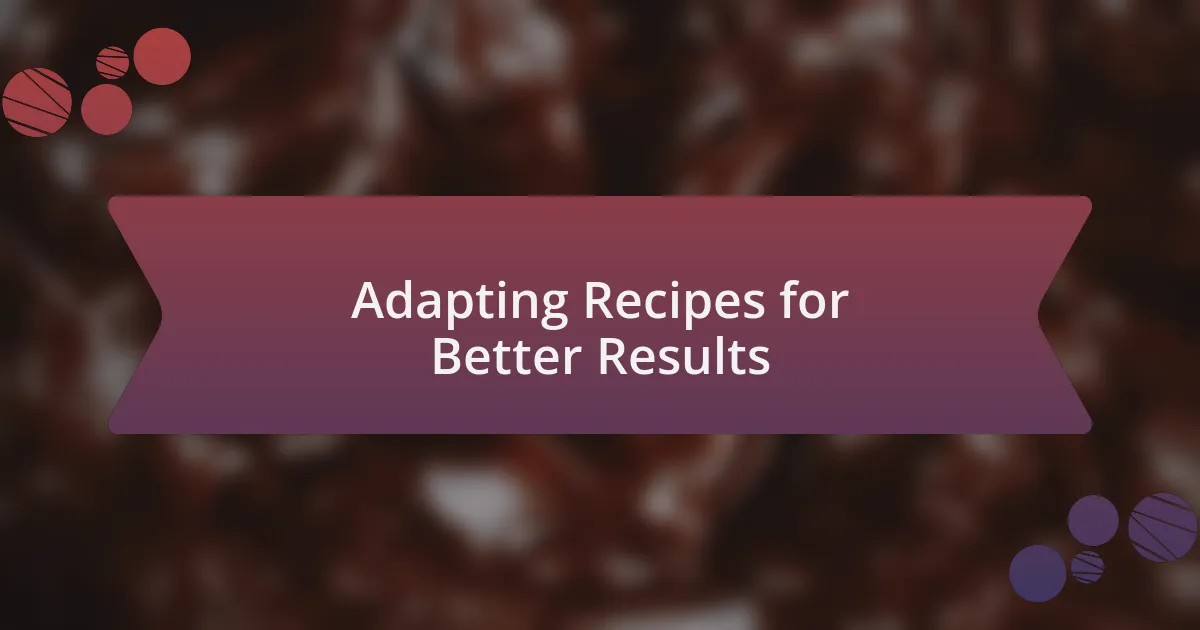
Adapting Recipes for Better Results
When I first attempted a vegan cake, I was disheartened by the lack of rise. Instead of following the recipe blindly, I decided to swap in applesauce for the oil and added a touch of baking powder. The result was a fluffy, moist cake that took on a life of its own, reminding me that sometimes, a small ingredient tweak can make a world of difference.
I remember trying to replicate a beloved chocolate chip cookie recipe but found that my cookies were spreading too much. After a bit of research, I learned that chilling the dough is key. So, I gave it a shot, letting it sit in the fridge overnight. The next day, I was rewarded with thick, chewy cookies that disappeared in minutes. Have you ever discovered an ingredient’s behavior changed dramatically based on a simple adjustment?
Understanding the science behind baking has truly transformed my kitchen experiences. For instance, I often underestimated the role of flour types and their protein content. Switching from all-purpose flour to bread flour in my pizza crust resulted in a delightful chewiness that I had been missing. Reflecting on those moments, it’s fascinating how knowledge can enhance our baking journey, making us not just better bakers, but more confident ones too. What changes have you made that turned a recipe from average to outstanding?